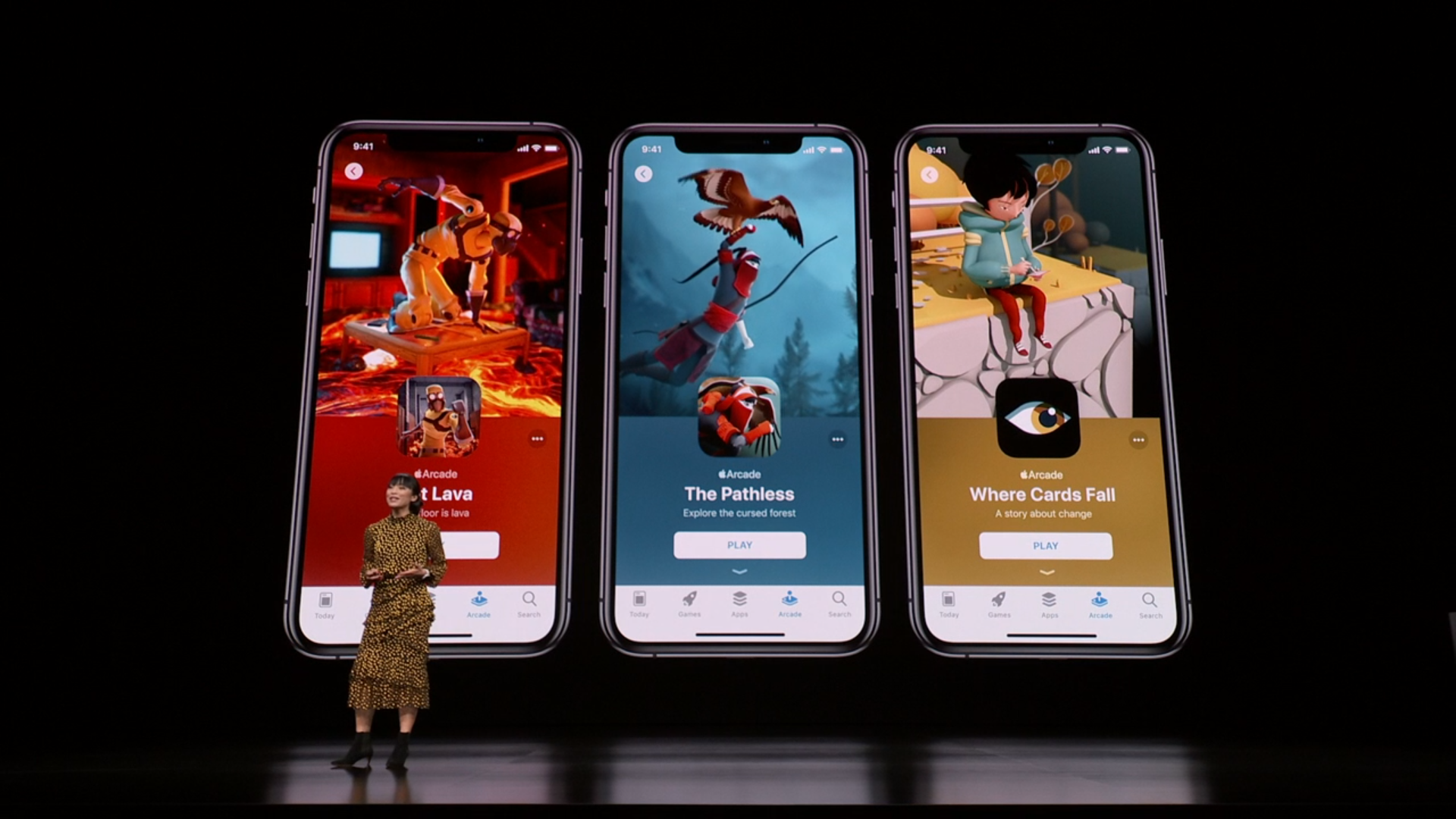GOOGLE v APPLE… FIGHT!
Joe Merrick
Apple and Google have now both had the chance to show us their visions of gaming’s future, and more importantly, how they aim to make a mint off it. The size and influence of both companies means any serious attempt by either of them needs to be given serious consideration, and the fact that both of them are pursuing wildly different approaches (on the face of it) makes things very interesting.
Simply put, regardless of how you feel about mobile gaming or the App/Play stores, the entire industry will be influenced one way or another by either Apple or Google in the years to come.
Let’s look at Google’s big reveal first: Stadia.
Remember OnLive? It’s that, but by Google so there’s less of OnLive’s whiff of DOA-syndrome.
The idea is that somewhere in Silicon Valley, Google has a couple of PCs capable of running Crysis, and you can use the internet to stream gameplay from those PCs to whatever screen you want to play on. At a glance, the idea makes sense; not everyone can afford the latest consoles or to keep a PC updated with the latest graphics cards. Google has very kindly offered to keep their PCs switched on to let you play games on them, for hopefully a lot cheaper than it would cost to own one.
It also means that, in theory, there’s a whole library of constantly available games to dip in and out of at a moment’s notice, a bit like Netflix. This could be a bad thing if you’re anything like me and get easily crippled-by-choice whenever I attempt to find something to watch on Netflix.
Google also claims that their network of ready-to-go gaming-rigs (ok it’s more than a couple of PCs…) will allow brand new ways to interact with games. You’ll be able to start playing a game mid-way through watching someone else play it on youtube; developers will be able to use the deep-learning network to emulate any art style in their games; multiplayer games will explode in size - Fortnite will have thousands of players. And so on.
This is where alarm bells starts ringing for me.
Here’s my first problem: Google will control the entire experience of every aspect of every game. Watching reviews of games, the decision to buy said games and then actually playing them will all be done through Stadia, Youtube and other Google products. It could be the most streamlined, easy-to-use system in the world, but it also means succumbing to Google’s terms at all times, and all but guarantees a homogenisation of what “video games” means in the future.
Put it this way: Is Stadia the kind of Petri dish that something like Tenya Wanya Teens could be created on? I’m not convinced.
My other problem probably has more to do with me getting older. I just don’t like the idea of streaming games. It might work great, but I’ve yet to be convinced; there’s always lag, and my broadband connection isn’t amazing at the best of times.
In the well-invested networks of Silicon Valley they might be able to get a 4K 60fps signal with imperceptible lag working fine, but out in the sticks on the Scottish countryside I’d be lucky to get anything like that - that’s not even to mention the bandwidth it must take up.
Streaming also brings with it the idea of always being connected, always on and always immersed in video games, and that just sounds like hell to me. Right now an entire generation of young people live that life; either watching or making daily youtube videos and Twitch streams in a constant flow of video game content. They clearly love it, because there’s no sign of the machine slowing down, but I’m too old for it. Also, you know what Google is like when it comes to ads and privacy. I think the “Don’t Be Evil” bus left the station long ago there.
For me, playing games and making stuff about them is a hobby and a pleasure. It’s something I like to escape to, not a prison for all my free time that I want to escape from, which is why Apple Arcade seems more appealing from what they’ve shown.
It’s a subscription service where you have access to a library of curated games. You choose what you want to play and the download and play it on any modern Apple device. I’ve got an iPhone and a MacBook Pro so I’m all set in that regard, and downloading games over my crap broadband might take a while but it’s at least more predictable than streaming.
I like that Apple is putting conscious choice at the heart of Arcade; from the curation of the games to the decision to download and play them, it’s a stark contrast to the wave of algorithm-fuelled content that Stadia might become - and Youtube suggests that that might well happen.
Before you call me an Apple fanboy and disregard what I just said, Apple Arcade still has some of the same problems as Stadia. It’s Apple’s ecosystem, for one. They’ll have just as much control over every aspect of the experience, for devs and players, that Google has with Stadia.
It’s also worth remembering that Apple Arcade is a solution to a problem of Apple’s own making. The App Store and iPhone gaming introduced the world to the Wild West of copycat freemium mobile games; a deluge of utterly shit, utterly worthless content.
Apple’s promise is that Arcade will be ad-free, micro-transaction free and all about quality, but it's their own mess they’re cleaning up, and I’ll take a lot of convincing before I’m willing to put Apple Arcade above playing games on my Switch or PS4. Who’ll win then? My prediction is that Stadia is the safest bet. The industry is going that way anyway and there’s no real way to stop it. Stadia is an attempt to capitalise on and control the current endless thirst for video game content, while Apple Arcade is a bit more traditional and old-fashioned in that regard. That’s probably why it appeals to me a bit more.
Either way, it’s safe to assume that the video game industry will be very different within the next decade.






